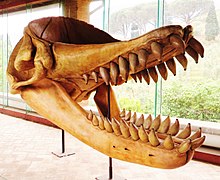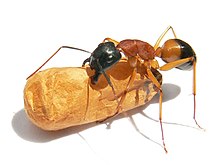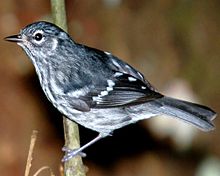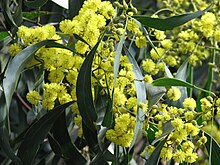Portal:Science
Science portal

Science is a systematic discipline that builds and organises knowledge in the form of testable hypotheses and predictions about the universe. Modern science is typically divided into two or three major branches: the natural sciences (e.g., physics, chemistry, and biology), which study the physical world; and the behavioural sciences (e.g., economics, psychology, and sociology), which study individuals and societies. The formal sciences (e.g., logic, mathematics, and theoretical computer science), which study formal systems governed by axioms and rules, are sometimes described as being sciences as well; however, they are often regarded as a separate field because they rely on deductive reasoning instead of the scientific method or empirical evidence as their main methodology. Applied sciences are disciplines that use scientific knowledge for practical purposes, such as engineering and medicine. (Full article...)
Featured article -
Featured pictures
Vital articles

Writing is the act of creating a persistent representation of human language. A writing system uses a set of symbols and rules to encode aspects of spoken language, such as its lexicon and syntax. However, written language may take on characteristics distinct from those of any spoken language. (Full article...)
Did you know...
- ... that Guy Parmelin, now President of Switzerland, opened the study program of cyber security of the Lucerne School of Information Technology in 2018?
- ... that Ana Štěrba-Böhm became the first Slovene woman with a doctorate in science, in 1911?
- ... that Brazilian computer science researcher and internet pioneer Tadao Takahashi negotiated with drug lords to install internet equipment in his country?
- ... that diverse fields study the mind, including psychology, neuroscience, cognitive science, and philosophy?
- ... that Australian Madeleine Steere played water polo professionally in Turkey after studying biomolecular science in the United States?
- ... that Ukrainian science fiction and fantasy is written both in Ukrainian and Russian?
Get involved
| This portal needs to be updated. Please help update this portal to reflect recent events or newly available information. Relevant discussion may be found on the talk page. |

|

|
Science News
- 21 November 2024 –
- The European Southern Observatory announces that its astronomers in Chile capture the first close-up image of a star outside the Milky Way. (The New York Times)
- 5 November 2024 –
- Researchers at Kyoto University in Japan launch LignoSat, the world's first wooden satellite constructed without screws or glue, into space. It will orbit Earth for six months. (DW)
- 10 October 2024 –
- In its annual Living Planet report, the World Wildlife Fund estimates that wild populations of animal species have decreased over 70% since 1970, with some high-biodiversity areas seeing up to 95% declines. (DW)
- 10 October 2024 – Tomb of Christopher Columbus
- Researchers from the University of Granada confirm that bones lying in the Seville Cathedral in Seville, Andalusia, Spain, belonged to Christopher Columbus. (ABC Spain)
- 9 October 2024 – Nobel Prize in Chemistry
- This year's Nobel Prize in Chemistry is jointly awarded to British computer scientist Demis Hassabis and American chemist John M. Jumper for their work on protein structure prediction, and to American biochemist and computational biologist David Baker for his work on computational protein design. (The New York Times) (Nobel Prize)
- 8 October 2024 – Nobel Prize in Physics
- American physicist John Hopfield and British-Canadian computer scientist Geoffrey Hinton are awarded this year's Nobel Prize in Physics "for foundational discoveries and inventions that enable machine learning with artificial neural networks". (The Guardian)

































































